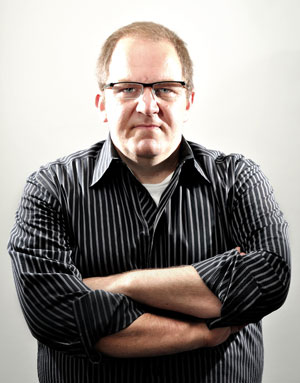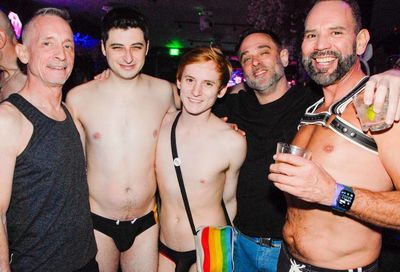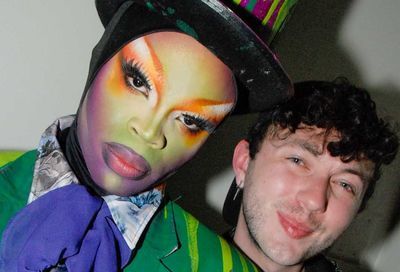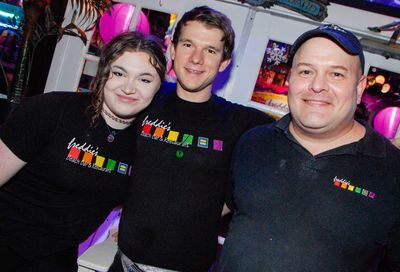Outraged
How Michael Rogers turned anger at the closet into a fight for equality
He’s not much of a grandstander. In person, he’s unassuming. He can laugh heartily, but he’s otherwise fairly soft-spoken. His roots are in suburban New York, where he was raised in a two-parent household with two older siblings.
And this is the guy the Washington Post dubbed ”the most feared man on the Hill?”

Mike Rogers
(Photo by Todd Franson)
Blow the whistle on a few closeted gay politicians and political operatives who are working to counter LGBT equality, and the title sticks. But while some corners of Washington may hate Rogers, he in turn loves the city.
”I knew in the first week that I was here that I was never going to go back to New York,” Rogers offers without hesitation. ”Politics is in my blood. I had no idea. I love Washington – the vibe here, the whole thing. I will never live in another city. You’re with the movers. When I’m invited into Nancy Pelosi’s conference room with 15 other bloggers – which I’ve done three times – that isn’t going to happen in New York. Sitting down and interviewing Harry Reid? For someone into politics, what I’m doing now is just a dream come true. This is the town to be in.”
While D.C. may be the town to be in, Rogers is preparing for a departure later this month, attending the Netroots Nation convention of progressive bloggers and activists in Las Vegas. While it’s unlikely he’ll be outing anyone in Nevada, Rogers’s skill-set goes far beyond closets. He actually got his start in fundraising. He’s held out the hat for public TV in New York, for Greenpeace, the Hetrick-Martin Institute/Harvey Milk School and the National Gay and Lesbian Task Force. He got a good dose of the gay community working in the gay chorale movement. In the virtual world, he’s the man behind PageOneQ, BlogActive and Raw Story.
No matter his résumé, however. Today he’s seen as the face in Outrage, Kirby Dick’s 2009 documentary about closeted politicos and Rogers’s role in calling out the ones working against their LGBT peers. Regardless of how he’s seen though, Rogers is not standing on Outrage laurels, and he’s not standing still.
METRO WEEKLY: What’s your involvement with Netroots Nation, exactly?
MICHAEL ROGERS: I’ve been involved in Netroots Nation now going on my fourth year. The short of it is it’s the national convention of new media, bloggers, activists – kind of the whole progressive left has been coming together at this convention that started out as more of an online blogger kind of thing. I do a number of things related to it. I run the LGBT caucus.
When they were all running for office – [Barack] Obama and [Hillary] Clinton and [John] Edwards – they all came to it. It’s a lot of organizational people who come now, so you’ll see the entire staff of Greenpeace or lots of people from different groups.
I’m the director of the [independent] National Blogger and Citizen Journalist Initiative. We raise money and send LGBT bloggers to these conferences. On this one, we’re doing $16,000 in scholarships. I’m also running the first pre-convention day for the LGBT community. The 25 recipients of our scholarships will be there. Representatives of LGBT organizations are coming in – everyone from Get Equal to HRC, across the spectrum.
MW: That doesn’t sound like a pool party.
ROGERS: This is not a pool party. The pool party happens at night. It is Vegas. [Laughs.]’
What I think is very unique about this conference and the work that’s happening in this realm is it’s a safe space for everyone – for HRC, for the Task Force, for street activists, ACT-UPers and Get Equal. When you have this spectrum of people who have what are often seen as disparate goals and views and where they’re headed, this is a place they can come together.
Each year, I’ve tried to expand the program. In 2008, with Netroots and bloggers, I brought together 60 bloggers here in D.C. for a long weekend of training, support, education, networking. We also did some joint events with the Victory Fund conference that coincided with it. We took that and said, ”We have this whole bunch of people who’ve been reading each other.” But nobody knew each other. What’s key here is taking ”online” and bringing it ”offline,” bringing that connection.
There are people I’ve worked with, employees that work for my company that I’ve never met in person. That’s the world we’re in. There’s a great gain in that. Look at voices like Pam Spaulding. Where would Pam be without the blogosphere? Here’s a woman in the Raleigh-Durham [N.C.] area, working at a university, and now she’s a really important voice in the community. That extends beyond when Pam goes to these conferences and she meets people and they like her.
When most people meet me, they say, ”Wow, you’re nice.” I’m a pussycat.
MW: The last time I interviewed you at length, it was about your online ”mini empire.” But now you seem to be coming full circle, heading back offline.
ROGERS: I think what we had was our legacy organizations – brick and mortar, whatever you want to call them – and then you have this whole new group of people who are shaking up the system. You have an organization and they’re lucky if they get 5,000 [online] visitors a day. Only the biggest are going to get that. But then you have a blogger like Pam, who’s pulling down maybe 20,000 hits a day. Or you have my site, Raw Story, we’re getting 300,000 page views every day. Who can compete with that?
You see the various organizations doing an online presence. It’s very important, but it’s institutional. Most of the organizations don’t allow commenting and there’s really not an exchange.
When an activist screams at HRC or the Task Force, they listen. And when those organizations speak, the activists are listening. It shows how important each is. I don’t know of many places that are doing what I’m trying to do at Netroots Nation. I mean, certainly there are wonderful conferences – there’s the Gay & Lesbian Leadership Institute, and NGLTF’s Creating Change. But there’s no real space outside of the movement. It’s okay to kind of step back and say, ”Where can we come together and put a face to the text?” It’s easy to hide behind a keyboard and a screen. That’s why there’s this whole shakedown going on. What is a publication? Who is a journalist? What is an editor? This is still evolving, the future of journalism.
But I’ll tell you where journalism is: Pam Spaulding goes to a City Council meeting and tweets the entire thing live. Chris Geidner has to analyze it. They’re both very, very important to the system.
MW: Beyond bloggers and the organizations and activists, what about the community in general? Are we losing our in-person connections in favor of online connections?
ROGERS: People will want the online because it’s accessible and it’s quick and it’s connected. But they’re also going to want to come to Washington. They’re going to want to feel a sense of community, being with people that are like them. And the Web can only go so far. Video is changing it, that helps. But as more and more technology comes along, there’s going to also be the need for people to connect with people. You can’t live your life in a Facebook box. That just isn’t going to fly with people.
Look at the march that took place. A hundred thousand people? I was blown away when I heard that. How? On the Web. When you think of the 2000 march or you think of the ’93 march, maybe they had 10 times as many people, but they certainly took a hundred times the amount of work to get ’em there. And what is the result of that, versus if you have a permanently engaged group of people online who are able to do things?
MW: Despite the organizing, you may still be best known for outing gay legislators and staff who oppose LGBT equality. That was reinforced with the release of the documentary Outrage, which is often referred to as ”Mike Rogers’s movie,” although the filmmaker is Kirby Dick.
ROGERS: I always say ”my movie.” ”Have you seen my film?” [Laughs.] Because not only was I one of the lead subjects, but I was effectively an assistant producer. Virtually everyone in that movie, a lot of those people, I reached out to them, I identified them. In a lot of the cases in the movie that were mine, I wasn’t mentioned, but I had provided a lot of the information.
But there are things in the film I don’t agree with. [Dick] gives far too much of a pass to [former Gov.] Jim McGreevey (D-N.J.). That storyline really bothered me. What bothered me most about it was the fact that the director didn’t think it was necessary to tell the audience that this was, in fact, the second woman he had married and had children with. He didn’t talk about the fact that he was corrupt and was sleeping with his illegally appointed Homeland Security guy. The story is not that Jim McGreevey was gay. The story is Jim McGreevey was corrupt and needed to deflect from that issue, so he got up and said he was gay. Now, this is good for us. I’m going to tell you why: 50 years ago, a corrupt governor who was gay would’ve gotten up and said, ”I’m corrupt,” to deflect from the gay thing. [Laughs.] Now it’s ”I’m gay,” and hopefully ignore the corrupt thing.
MW: While Outrage was compelling, I thought your interview with News Channel 8’s Doug McKelway about the movie was more shocking. For him to suggest he’d ”take you outside and give you a punch across the face,” you certainly hit a nerve.
ROGERS: Did you see the video? Does he really threaten me? It was certainly unprofessional. It was a horrible interview on his part. He made himself look like an idiot.
MW: You must know better than most about the psychology of closeted people, so maybe you can tell me why they would want these positions in the spotlight. Whereas being gay was once considered an illness, watching the subjects in the movie makes me think this duality of being closeted while seeking a high-profile job is an illness.
ROGERS: Oh, absolutely. I do think, also, there are different levels. You have a [former Sen.] Larry Craig (R-Idaho) and then you have a [Rep.] David Dreier (R-Calif.). Those are two very different archetypes. Larry Craig, literally, I believe, based on the people I’ve met, would have sex with a man and then a day later wouldn’t remember that it happened. It would just be a black out. That’s not Larry Craig hanging out in the closet. That’s Larry Craig having a pathology that he needs to deal with. As opposed to David Drier and a lot of these other guys. They’re just closet queens.
MW: But this strange psychology doesn’t seem in any way to be exclusive to closeted gays. [Former Sen.] John Edwards (D-N.C.) comes to mind. All these skeletons, and he still wanted to be president?
ROGERS: And still tried to be attorney general. I’m going to try to be the president of the United States in 2008, and no one is going to know I have a ”love child” on the side?
MW: Why is this seemingly commonplace?
ROGERS: Power. This is what’s amazing about these guys. I almost feel like, did they get in a room and say, ”Who is going to run the ‘protecting children on the Internet’ thing?’ [Former Rep. Mark] Foley? Okay, that’s yours.” Then they have a room full of people in 2000 and they say, ”Who is going to stand up and say ‘Don’t Ask, Don’t Tell,’ isn’t strict enough? [Former Rep.] Ed Schrock? Okay, you’re in charge.” It’s just amazing to me. They are guilty of the very thing they rail against.
Same with [former New York Gov. Eliot] Spitzer. I have no problem with what Eliot Spitzer did, except for the fact that he started the department that went and tore down all the high-priced prostitution firms. [Laughs.] It’s in that same realm of Schrock and Foley.
MW: Still, when you out politicians for anti-gay hypocrisy, it seems difficult for some people to understand you’re not just outing people for the heck of it. Or that the outings are nonpartisan.
ROGERS: [Former Republican National Committee Chairman] Ken Mehlman is like, ”Oh, you’re going to destroy the life of some young kid.” If you’re an envelope opener, I don’t care if you’re opening envelopes for [former House Majority Leader] Tom Delay (R-Texas). No kid should grow up in a state and think, ”I can’t be an intern for my senator,” whether or not [the senator] is anti-gay.
A great case of this is if you look at [former Sen.] Elizabeth Dole (R-N.C.). When this all started, she pulled her team in and they brought it up. She said, ”One of my staffers is concerned … and this is not an issue.” I got a call from an intern who was working for her, [who was] gay. I said, ”Listen. You grew up in North Carolina. You went to school there. You want to be an intern for your U.S. senator. You should go ahead and do that, and you should learn a lot. I encourage you to do that.” Why would I want to go after some 23-year-old kid on the Hill? Nah. But if that 23-year-old kid is the director of communications for some homophobe, who is writing the messaging, who’s doing the dirty work, then we have a different problem.
MW: What prompted you to take this tack? Was there a slow build to this idea of outing certain politicians and political staffers?
ROGERS: The crux of what motivated me was the use of the [former President] George Bush campaign, the second time, around marriage. I knew there were all these fags running around Washington drumming up support for this Federal Marriage Amendment.
I didn’t know much about blogging, but I knew this information was out there. What I did before the blog was I went into Gay.com chat rooms and instead of a picture, I had a graphic that said, ”Do you know any anti-gay politicians or highly placed government officials? Write to….” It was as basic as you get. And when those e-mails started flooding my box, I decided I had to set up some vehicle to move the information.
MW: And the rest is history?
ROGERS: It’s time for the next chapter. The outing work, it’ll never be gone. As a journalist, stories arrive and you write them. But you won’t be seeing Mike Rogers doing this to the extent that he used to. Blogactive was my, almost, full-time job for a while. This has, hopefully, never been the single thing to define me. As time goes on, it’s going to be less and less. Now, when you have a documentary that you’re a big piece of, it’s certainly part of who you are. I’m proud of that. But I certainly don’t see myself as the guy doing outings forever.
MW: Although the outings can get pretty nasty – McKelway’s interview, for example – there’s another platform you’re involved with that I’ve also seen get pretty nasty. You manage a listserv with hundreds of LGBT activists, journalists, movement leaders, etc. Sometimes that list gets pretty contentious.
ROGERS: The reason I created the list was because no one knew who I was. I was looked at as, ”Who the hell is this? Who is this guy, showing up and dragging people out of the closet?” I realized that in the movement there were so many people that don’t understand what they’re doing, where they come from.
[The list] is a wonderful thing for the various parts of our community. It’s really important for HRC to see what this Get Equal stuff is all about, but likewise it’s just as important for Get Equal to realize there’s a history here. When someone comes in and accomplishes something, it’s because somebody’s been beating the pavement for 20 years. Different angles, but it’s one battle.
When I founded the list, my goal was to bring together all of these different viewpoints and perspectives. You have some viewpoints that are more liberal, some are relatively conservative. But I’m more interested in perspectives. What makes the list really unique is not only does it have activists and leaders of professional things, but it also reaches into every state. It becomes this really important resource where it’s people talking about the need to protest outside the White House while there are people inside talking to the leadership of the White House. Or it’s hearing from journalists looking for a source. It’s really a response to a need to have a rapid-fire communication system.
MW: That’s great. But it does get nasty.
ROGERS: Oh, yeah. That’s why I’m on the list. For someone who has such strong political views, I have found it a rewarding challenge to be pretty evenhanded. My politics are pretty left. I have definite views about a lot of this stuff. But I try to maintain an even hand and see what both sides are saying, because they are both right.
MW: The discourse often reads as though they are both wrong. No one could argue it’s en echo chamber.
ROGERS: I guess that means the list is a success in some fashion, in that I haven’t limited it to people with like-minded thinking. They may not always agree, but they’re all right. That’s what I think we need a little bit more of on the left – not just the LGBT left – but overall in the progressive left there needs to be a little bit more meeting in the middle to be more effective.
I say to people, let’s have a meeting where 25 bloggers can sit down with Michael Cole of HRC, sit down with Rashad [Robinson] at [Gay & Lesbian Alliance Against Defamation], where all of these people can come in – Victory Fund, the Task Force, Immigration Equality, Freedom to Marry, name the group. They don’t deal well without structure. They have five-year plans and 10-year plans and 20-year plans and flow charts, where bloggers have boxer shorts in living rooms. The structure that I’ve been creating – and I hope to expand – is to create a space that is safe for both.
MW: So you’re an organizer at heart?
ROGERS: I’m a change agent at heart. Yes, organizing is a huge piece of that, but so is reporting and telling the truth. So is fundraising.
MW: Okay, so dialing back the outings, revving up the organizing, what else is next for you?
ROGERS: I’m involved with setting up a financial services company that I can just say is going to revolutionize the way young people save in America today.
MW: Wow, totally left field. I didn’t see that coming.
ROGERS: Totally left field. I’m working with some really exciting people on it.
MW: Before I let you go, I want to ask about any backlash. When TV reporters are alluding to beating you up, you must be a little cautious.
ROGERS: I do have an alarm system. My friends all joke about my alarm system. But have you seen my movie?! [Laughs.]
MW: So you sleep soundly?
ROGERS: I do. I have a new bed.
Support Metro Weekly’s Journalism
These are challenging times for news organizations. And yet it’s crucial we stay active and provide vital resources and information to both our local readers and the world. So won’t you please take a moment and consider supporting Metro Weekly with a membership? For as little as $5 a month, you can help ensure Metro Weekly magazine and MetroWeekly.com remain free, viable resources as we provide the best, most diverse, culturally-resonant LGBTQ coverage in both the D.C. region and around the world. Memberships come with exclusive perks and discounts, your own personal digital delivery of each week’s magazine (and an archive), access to our Member's Lounge when it launches this fall, and exclusive members-only items like Metro Weekly Membership Mugs and Tote Bags! Check out all our membership levels here and please join us today!





















